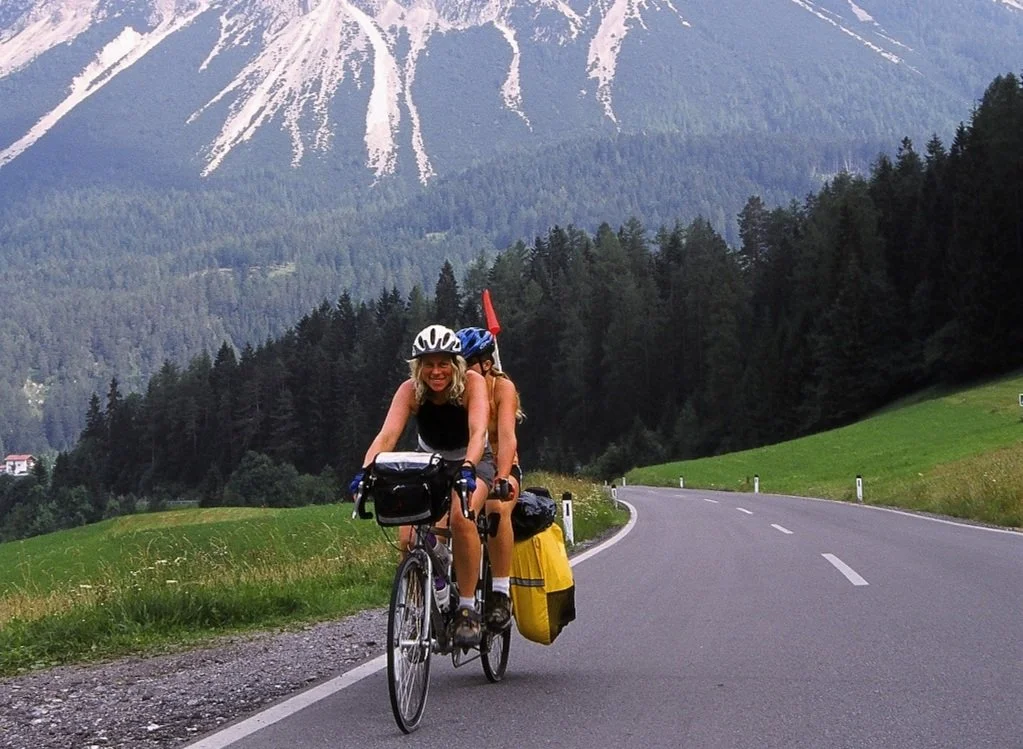cycling for clean air
Meet the Eber family, globe-trotting advocates for low carbon travel
Cycling over the Austrian Alps to escape heat in Italy
On an adventure of a lifetime, Paula Holmes-Eber and Lorenz Eber left their home on Bainbridge Island in 2003 with daughters Yvonne (11) and Anya (13) to pedal around the globe on tandem bicycles. Their goal: to raise awareness and research funds for asthma, from which Paula suffers, and promote carbon-free travel. Two decades later, the couple is undertaking another epic cycling tour to promote Breathtaking, their recently released book chronicling that 16-month journey that spanned 24 countries and raised $65,000. We caught up with them in July as they set off on the Seattle-to-San Diego leg of their two-wheeled, North American book tour, which concludes in October in New York City.
You’re now on a 2,000-mile book tour on bikes, your longest since circumnavigating the globe. Is your approach any different 20 years later?
Paula: Our approach has not really changed, though we've upgraded equipment, and smartphones have made travel almost too easy. Lorenz and I have divided the labor so that he cooks and fixes equipment, while I set up the tent and plan the route. We will be camping about 60-70 percent of the time. And we are accepting donations for Asthma and Allergy Foundation of America and International Asthma Services on our website. We will admit that cycling without kids is so much simpler!
On your around-the-world bike trip, how did people you encountered along the way react to you?
Lorenz: Once people found out what we were actually doing, they were usually amazed and tried to give us all the help they could. A Japanese sports drink salesman gave us free samples of his sports drinks and some T-shirts. The groundskeeper of a soccer field where we camped wild (and possibly illegally) came up to me and handed me a can of beer in the evening. In Australia, where we had just put the signs onto our bikes, people stopped their cars and handed us $50 and $100 bills out of their windows so that we could donate the money to asthma. Many of the people we met had relatives who either had asthma or who had died of asthma.
Getting enough calories every day must have been a challenge.
Lorenz: Food was a major concern for all of us. In Japan food was delicious but extremely expensive, and we could not afford to buy very much of it. The only thing that saved us in Japan (where we actually considered leaving early because of the food scarcity) was that we by accident found a garbage bag full of about 60 ramen noodle packages that had fallen off a truck. With those ramen noodles stuffed into our panniers, we made it another two weeks in Japan.
What impact did your trip around the world have on your lives and relationships?
Paula: All of us have built lives that are inextricably linked to our experiences. Most of us have chosen paths focusing on advocacy for world issues. Anya is getting a doctorate in Criminology at Oxford, working on protecting archeological artifacts around the world. Yvonne is working on a doctorate in pediatric nursing at UPenn, focused on improving health care for children in underserved communities. I ended up teaching about Middle East culture to senior military leaders at Marine Corps University near Washington DC for almost a decade. Lorenz remains passionate about travel and adventure, building and flying his own airplane.
All of us are passionate about the outdoors, and we have continued to bike, hike, backpack, ski, kayak and sail together as a family. We are still a family, like any other family, with our arguments and special moments. But the world journey has bound us together in a way that is unbreakable.
What did you learn about yourselves?
Lorenz: One of the most important lessons that we learned was that leadership is of ultimate importance on an expedition but very hard and difficult. Once you are a leader you realize quickly that all the decisions you make can have profound consequences and that those consequences are your making. It is always easy to blame other leaders, but when you are actually leading it is not all fun. Some decisions are really hard and will not be appreciated by the team.
How essential was the support of local businesses and friends?
Lorenz: The ride was a great collaboration of many Bainbridge and Seattle folks without whom we could have not even thought of attempting this journey. Logistics support from our friends was 100 percent essential. Receiving emails from them on our BlackBerry kept all of us going.
What effect has asthma had on your lives?
Paula: For me, our journey around the world (and this book) is my own effort to come to terms with my extremely sickly childhood and the disease that has dominated my life ever since then (including, of course, struggling to bike around the world).
Do you still worry about air quality?
Paula: The issues that drove us to bike around the world—clean air and its effect on our lungs—-have only become worse since then. When Covid made us all stay indoors, I was happy but also horrified to walk along Manitou Beach one day and suddenly see Seattle and the Cascades without the normal orange haze that always lies over the city. I realized then how important it is to take action now to protect our air and lungs.
What’s your advice for people who want to travel more sustainably?
Paula: We need to rethink why and how we travel. By checking off bucket lists, squeezing in five flights to 10 cities in a week and focusing on getting that perfect selfie shot in front of all the famous world sites (like everyone else), we miss experiencing the amazing, colorful world of kind, generous people, cultures and places that we whiz by. Sustainable travel, whether by bike, on foot, by train or bus, forces us to slow down and plan a simpler itinerary that allows us to meet people, step inside their culture and truly experience the world.
Children are a wonderful gateway to meeting others. Instead of waiting until the children are older, I suggest traveling as early as possible with them. Young children are very adaptable and will make friends regardless of language or cultural difference. To start, I recommend that people try a short trip—a weekend bike or hiking trip to a bed and breakfast, a short train or boat trip where you don't bring a car (think Victoria Clipper or train to Vancouver, Canada). Once you have the hang of it, bigger trips become easier.
Any other big bike trips on your bucket list?
Lorenz: We want to go back to New Zealand and cycle the southern part of the South Island, which we didn't explore enough. Then of course there are other trips not necessarily involving bicycles. We would like to sail the Adriatic in our own sailboat. And Paula and I want to go barnstorming across America in the airplane that I built in my garage.


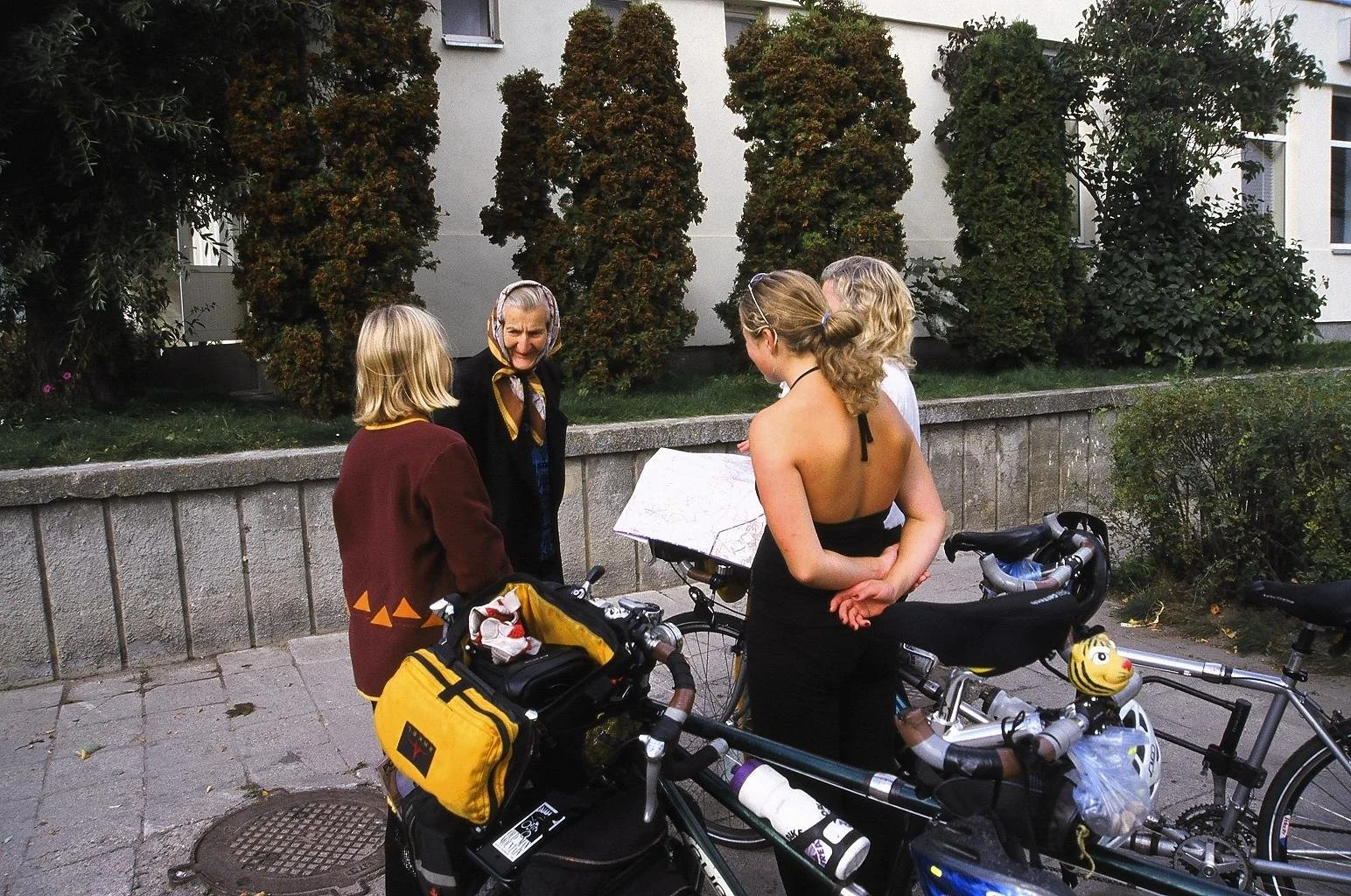


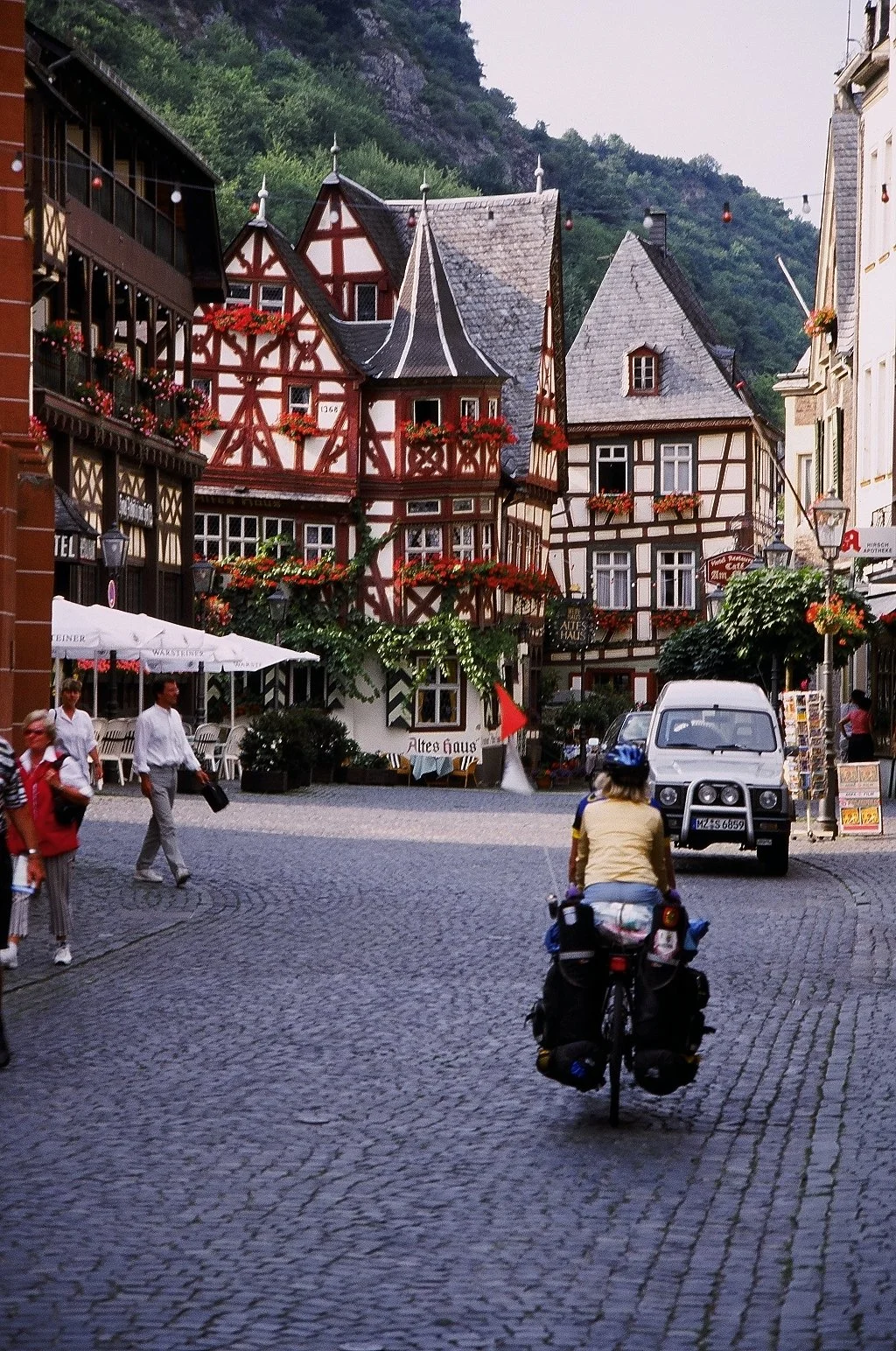
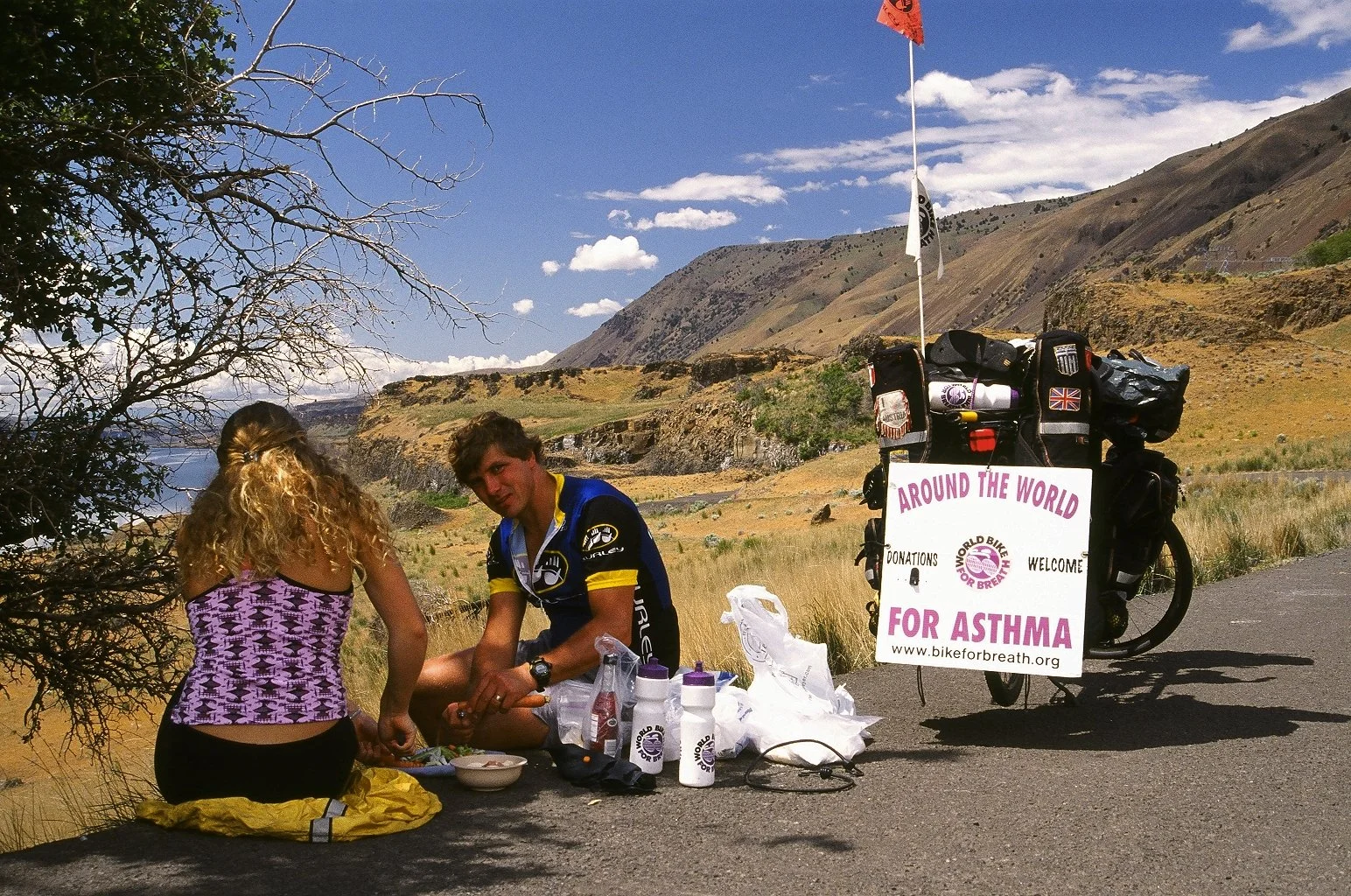
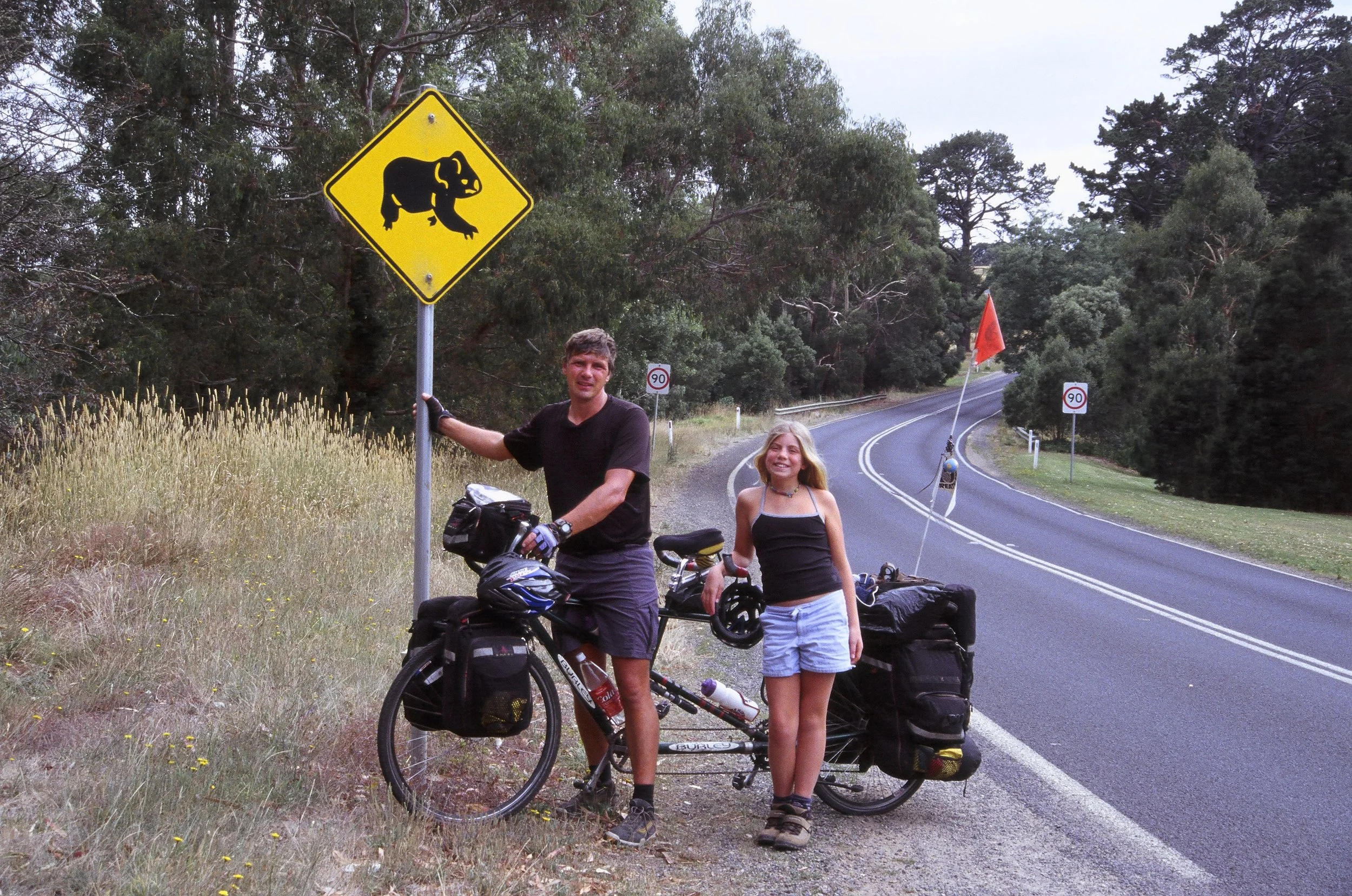
Photos: Lorenz Eber

